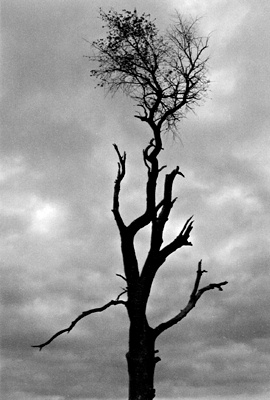All Nonfiction
- Bullying
- Books
- Academic
- Author Interviews
- Celebrity interviews
- College Articles
- College Essays
- Educator of the Year
- Heroes
- Interviews
- Memoir
- Personal Experience
- Sports
- Travel & Culture
All Opinions
- Bullying
- Current Events / Politics
- Discrimination
- Drugs / Alcohol / Smoking
- Entertainment / Celebrities
- Environment
- Love / Relationships
- Movies / Music / TV
- Pop Culture / Trends
- School / College
- Social Issues / Civics
- Spirituality / Religion
- Sports / Hobbies
All Hot Topics
- Bullying
- Community Service
- Environment
- Health
- Letters to the Editor
- Pride & Prejudice
- What Matters
- Back
Summer Guide
- Program Links
- Program Reviews
- Back
College Guide
- College Links
- College Reviews
- College Essays
- College Articles
- Back
The Tree
There is a tree by the black and winding river, a tree that hides my shame and discontent with the earthly world. The roots of the tree wind themselves around the bitterness; they choke it with their long tentacles just as it in turn chokes the life of the tree. When I held the substance in my possession, a ceramic urn steady above the fireplace, I could not control its power and devastation. It drove me to the tree, to finding a way to dispose of its corruption once and for all.
It began on an eerie morning in early winter, the kind of morning where you feel something coming but ignore the impulse, expecting nothing out of the ordinary. I was folding his clothes and watching the news when cameras turned towards my life; there he was, his face plastered across the television, my boy, the schoolyard, men with guns and black uniforms, what was going on? Was everything alright? Was he alive? Was he hurt? I listened, focused my attention. A parent’s worst nightmare was my first reaction. Then it became far worse; his picture—not a memory, but an image of evil, for he was not a victim but an offender, an instigator. I held a different image of him, a clean t-shirt on a bloody morning. And then everything was spinning, spinning fast.
That is the worst kind of loss; the kind of loss where you lose not only the person you loved more than anything in the world, but more than that you lose what you thought they were or perceived them to be, because through their own death they disprove everything you understood about them, all that you were once so sure of. That is what he did to me. If I could hate him for being so selfish, I would. But I can’t. And I don’t. And therein lies my torture.
The decision was made logically; if he were kept inside the house, no one could break him or destroy more than he had already been destroyed; a simple choice for a complex problem. No marker for people to express their hate openly. It was my only realistic option.
Having him in the house was like savoring my demons; not a day without looking at him, a cold vessel of ash, embittered and haunting, yet no matter how hard I tried, I could not avert my eyes. My eyes hungered for his human presence, to be able to see him again in flesh and to talk to him, a startling image of myself. I longed for the ability to start everything over, for the ability to erase the perception that I had failed him in life.
I could no longer handle the excruciating pain and sour joy his inhuman presence brought to me. It was time for him to go away, to leave me alone and stop torturing me. I envied people who could bury their loved ones far from their living rooms without fearing what people would leave at their tombstones, people who could separate life from death.
And so I created the tree.
The tree was my conception of an unmarked grave, so that no one would know where he lay but myself. I took a shovel and buried him deep under the ground when no one else was around to see. It is a lonely place. I go to visit him sometimes, and I see that the tree is slowly dying. Why I do not know, but I cannot help but think of him and his slow suffering of which I was unaware. The tree represents the suffering; it only magnifies and intensifies the pain. It would have been the opposite, but it now hurts me more than keeping him in the predictable environment of my family room, the room for my family.
If I could capture an emotion of grief and shame and sadness and bitterness, a deadly cocktail, I would use the tree to describe it. It embodies my pain and taunts me torturously. I hate myself for loving him still, after all the pain he has caused myself and so many others. I look back to the dark and ominous river, moving faster and faster, the rapids picking up speed and strength over the large, jagged rocks—to me it looks delicious and inviting. I can hear it calling me, tempting me. Will I heed its call? Will I choose to be selfish? Or will I step back and refuse; will I find a way to be strong, to help prevent others from the suffering that I so dangerously suffer? I make my decision in a split second, feeling the dirt firmly beneath my feet, moving quickly along the path which climbs slowly back up, away from the tree. Soon, the tree is no longer in sight.

Similar Articles
JOIN THE DISCUSSION
This article has 0 comments.
